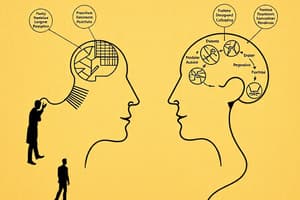Podcast
Questions and Answers
What is a potential consequence of low statistical power in research?
What is a potential consequence of low statistical power in research?
- Increased accuracy of results
- Greater replicability of findings
- Higher likelihood of false positives (correct)
- Improved methodological training
Why is pre-registration of studies beneficial in research?
Why is pre-registration of studies beneficial in research?
- It eliminates cognitive biases
- It enhances methodological training
- It guarantees positive results
- It promotes transparency in reporting research (correct)
How can collaboration in research improve generalizability?
How can collaboration in research improve generalizability?
- By employing lower-powered designs
- By reducing the sample populations involved
- By increasing the diversity of methodologies used (correct)
- By limiting the types of analysis performed
What is one major issue with the current incentives in publishing research?
What is one major issue with the current incentives in publishing research?
What method can researchers use to protect against cognitive biases in study results?
What method can researchers use to protect against cognitive biases in study results?
What defines an exact or direct replication?
What defines an exact or direct replication?
Which of the following is NOT a reason for the replication crisis?
Which of the following is NOT a reason for the replication crisis?
What is the primary goal of replications in research?
What is the primary goal of replications in research?
What distinguishes conceptual replication from direct replication?
What distinguishes conceptual replication from direct replication?
In Daryl Bem's studies, what controversial phenomenon did he suggest existed?
In Daryl Bem's studies, what controversial phenomenon did he suggest existed?
Which of the following practices is encouraged under open science principles?
Which of the following practices is encouraged under open science principles?
What common issue can contribute to a failure to replicate a study?
What common issue can contribute to a failure to replicate a study?
What was a criticism aimed at Daryl Bem regarding his statistical methods?
What was a criticism aimed at Daryl Bem regarding his statistical methods?
How can sample size affect an experiment's replication success?
How can sample size affect an experiment's replication success?
Which of the following statements is true regarding the Open Science Collaboration's 2015 replication study?
Which of the following statements is true regarding the Open Science Collaboration's 2015 replication study?
Which of the following best describes liberal statistical demonstrations?
Which of the following best describes liberal statistical demonstrations?
What is the implication of the reproducibility crisis in research?
What is the implication of the reproducibility crisis in research?
What is a significant consequence of the 'publish or perish' culture in research?
What is a significant consequence of the 'publish or perish' culture in research?
Which methodological issues can prevent a successful replication of a study?
Which methodological issues can prevent a successful replication of a study?
What effect does a liberal statistical approach have on research findings?
What effect does a liberal statistical approach have on research findings?
In replication studies, what is a common reason for differing confidence intervals?
In replication studies, what is a common reason for differing confidence intervals?
Flashcards
Conceptual Replication
Conceptual Replication
An experiment that aims to support the same theory or hypothesis as the original experiment, even if it uses slightly different methods.
Replication Failure Reasons
Replication Failure Reasons
Reasons why an experiment might not reproduce the results of a previous study, ranging from fabricated data to methodological differences.
Open Science Collaboration (2015)
Open Science Collaboration (2015)
A large-scale project that attempted to replicate 100 published psychological studies.
Replicated Study - 25% Non-Replicable
Replicated Study - 25% Non-Replicable
Signup and view all the flashcards
Different Effect Sizes
Different Effect Sizes
Signup and view all the flashcards
File Drawer Problem
File Drawer Problem
Signup and view all the flashcards
Bad Research
Bad Research
Signup and view all the flashcards
Statistical Analysis
Statistical Analysis
Signup and view all the flashcards
Blinding
Blinding
Signup and view all the flashcards
Statistical Power
Statistical Power
Signup and view all the flashcards
P-Value
P-Value
Signup and view all the flashcards
Pre-registration
Pre-registration
Signup and view all the flashcards
False Positive
False Positive
Signup and view all the flashcards
Social Orientation
Social Orientation
Signup and view all the flashcards
Task Performance in Groups
Task Performance in Groups
Signup and view all the flashcards
Replication Crisis
Replication Crisis
Signup and view all the flashcards
Daryl Bem's ESP Study
Daryl Bem's ESP Study
Signup and view all the flashcards
Liberal Statistical Analysis
Liberal Statistical Analysis
Signup and view all the flashcards
Exact Replication
Exact Replication
Signup and view all the flashcards
Replication Importance
Replication Importance
Signup and view all the flashcards
Preventing False Positives
Preventing False Positives
Signup and view all the flashcards
Study Notes
History of Social Psychology
- Aristotle: Society shapes human development
- Comte: People cause and are the products and producers of society
- 1879: Wilhelm Wundt established first psychology lab, separating psychology from philosophy and biology.
- 1898: Norman Triplett began social psychology, writing the first paper on Social Facilitation theory.
- John Dewey founded social psychology via collectivist work, benefiting masses by shaping society.
- 1908: McDougall published first social psychology textbook
- 1920-1930: Floyd Allport considered the father of social psychology and experimental psychology, focused on individual dispositions, not society
- Allport's work included Great Depression research, where community ties were found to be a protective factor against hardship.
- Summers criticized treatment/testing of African Americans, criticizing Western IQ tests for applicability to other cultures, being the father of Black psychology
- 1930-1950: Festinger's work focused on conformity, obedience, and authority during World War 2, studying experimental lab research and the impact of WWII on ethical social psychological research
- 1970-2000s: Increased use of correlations in Pluralism research, diversity and inclusion, and focus on oppressed groups.
Global Events
- Examples of global events studied by social psychologists include war in Ukraine, the Black Lives Matter movement, climate change, and the COVID-19 pandemic.
- Findings span from psychological consequences of war, to mental health effects, to impacts on societal issues or behaviours.
Skinner and Cognitive Revolution
- Skinner: Behaviourist, believed mental states preconditioned human behavior
- Cognitive Revolution challenged behaviorism, emphasizing the influence of thoughts and ideas on actions
- The text explores how social psychology shifted beyond behaviorism.
Lewin's Interactionalism
- Lewin's interactionalism perspective: Behavior and attitudes interact between a person and environment.
- Lewin's work included social psychology research outside the lab.
- Lewin's studies showed subjective experience impacts people more significantly than objective realities.
- Social psychology work affected government/military/law enforcement.
1960-70s and beyond
- Increased changes in social psychology with the Milgram prison experiment, Zimbardo's obedience simulation, and questioning of ethical practices, where ethical concerns were raised about social psychology experiments.
- Increased use of lab research combined with correlation research for more comprehensive measurements and study populations.
Social Facilitation
- Introduction of Social Facilitation theory via Norman Triplett
- Explanation that the presence of others enhances performance, supported by studies involving cyclists and fishing.
- Aerodynamic, psychological, and encouragement theories explored
- Triplett conducted specific studies to find and answer the cause for cyclists being faster in paced racing when comparing them to solo cyclists. These studies included different forms of research such as the "fishing line kids" test.
Social Inhibition & Drive Theory
- Robert Zajonc's Drive theory (1965).
- Presence of others causes arousal which helps dominant responses but hinders non-dominant ones.
- Performance depends on the difficulty of the task, with high performance in simple tasks/familiar environments and poor performance in new or complex tasks.
- Drive theory criticized for lacking objective criteria, and having limited meta-analytic support, showing inconsistencies and contradictory results.
- Michaels et al (1982) studied pool players' performance, showcasing better performances from experts with an audience and poor performances by novices with an audience
Individual and Dispositional Factors
- Uziel's (2007) Personality theory that individuals with positive social orientations performed better among others, while those with negative orientations performed better alone.
- Demonstrates that individual personality factors influence social facilitation, not just environmental factors.
Replication Crisis
- Bem's (2011) ESP studies.
- Ioannidis (2005) found that many published research findings are false due to flaws in scientific practices
- Replication crisis identified many published research findings were false because of methodological flaws.
- Critiques of published studies, and the need for proper methodology.
Ways to Improve Research
- Improve methodology training.
- Use multidisciplinary team support, removing conflict of interests.
- Collaboration across groups for more comprehensive research methods/testing, improving generalisability.
- Pre-registration of studies, promoting quality. Improve transparency in reporting research
- Describing methods clearly allows for correct replication
- Establish incentives to encourage replicability and accuracy in research.
Deception in Experiments
- Importance of informed consent.
- Debriefing participants after the study.
- Participants being able to withdraw consent at any time.
Measure to Ensure Replicability
- Utilizing proper methodology for reporting and disseminations and using proper evaluation methods. Methods need to be well described in order to successfully replicate them. Correct interpretation methods should be employed.
Studying That Suits You
Use AI to generate personalized quizzes and flashcards to suit your learning preferences.




